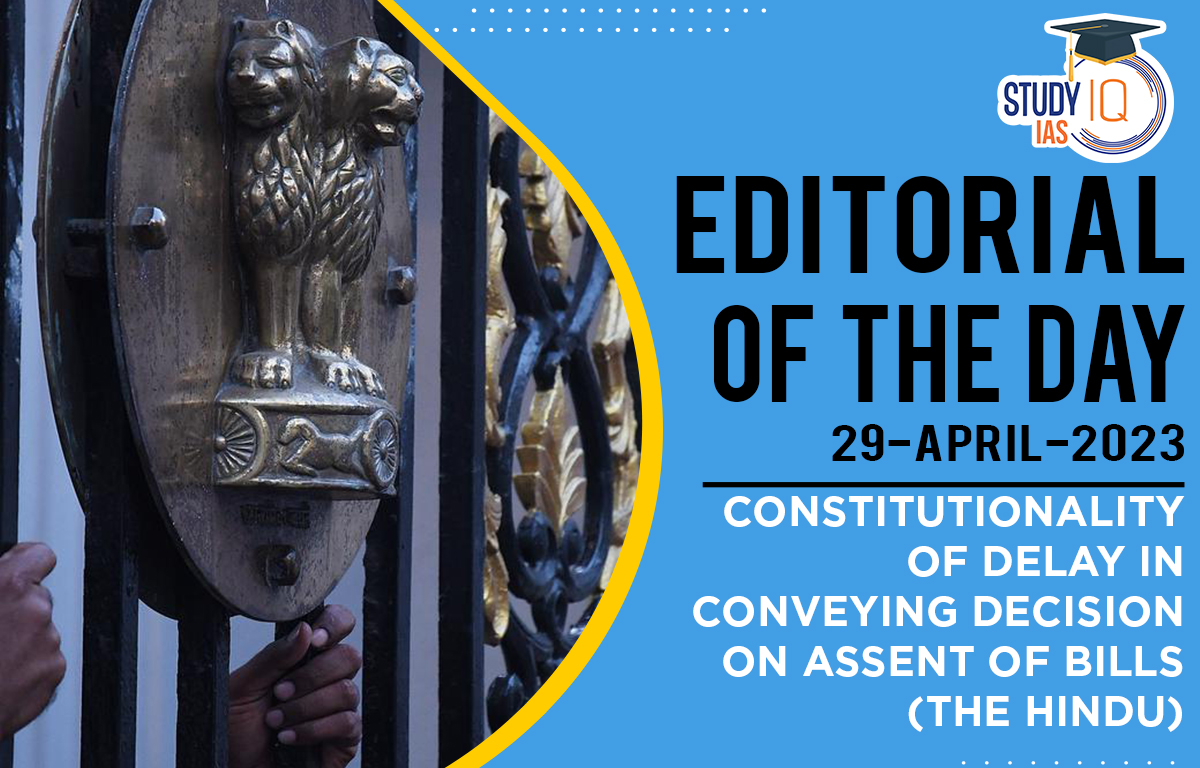Table of Contents
Context: The article is discussing the recent decision by the Supreme Court to remind Governors of their constitutional obligation to make a decision on returning a Bill to the State Assembly for reconsideration “as soon as possible”. This decision was prompted by apparent inaction by the Telangana Governor on several Bills, which led to a petition being filed with the Court. The article also highlights the broader controversy surrounding the discretionary powers of Governors in India with respect to granting assent to Bills, which has been a source of conflict between the government and Raj Bhavan. It suggests that the current provisions of the Constitution related to gubernatorial discretion need to be reformed to prevent misuse and ensure that the government’s advice is given due weight in the legislative process..
Constitutionality of Delay in Conveying Decision on Assent of Bills Background
The Office of the Governor:
- About Governor:
- Governor is a nominal executive head of the state.
- He forms an important part of the state executive where he acts as the chief executive head.
- Envisaged role of Governor:
- Vital link: Between the centre and the states.
- Maintenance of national interests, integrity and internal security advocates central supervision for which the governor is required.
- Responsible government: For increasing responsible government in the states.
- Smooth functioning: Crucial in smooth functioning of democracy.
- Check arbitrariness: Governor is to check arbitrariness of the state government.
- Appointment of Governor:
- The Governor is neither directly elected by the people nor indirectly elected by a specially constituted electoral college as is the case with the President.
- He/she is appointed by the President of India by warrant under his hand and seal (Article 155).
- While drafting the Constitution, the ‘Canadian model of Governor’ appointment by the Centre was accepted in the Constituent Assembly.
- Qualifications:
- The Constitution lays down only two qualifications for the appointment of a person as a governor.
- He/she should be a citizen of India.
- He/she should have completed the age of 35 years.
- Additionally, two conventions have also developed in this regard over the years.
- He/she should be an outsider, meaning not belonging to the State of appointment so as to remain free from the local politics.
- While appointing the Governor, the President is required to consult the Chief Minister of the State concerned, so that the smooth functioning of the constitutional machinery is ensured.
- The Constitution lays down only two qualifications for the appointment of a person as a governor.
- Constitutional Position of the Governor:
- Article 153: Article 153 of the Indian Constitution mandates the appointment of a Governor in each state. The 7th Amendment to the Constitution, however, allows for the appointment of the same person as Governor of two or more states.
- Article 154: The Governor shall have executive power over the state, which he shall exercise either directly or through officers subordinate to him in conformity with this Constitution.
- Article 163: There shall be a council of ministers, led by the Chief Minister, to assist and advise the Governor in the exercise of his powers, except when he is compelled to execute his functions at his discretion.
- Article 164: The council of ministers is collectively responsible to the state’s legislative assembly. This provision is the cornerstone of the state’s parliamentary system of governance.
- The Constitutional power of the Governor related to State Bills:
- Article 200 says that the Constitution provides certain options for the Governor to exercise when a Bill reaches him from the Assembly.
- It deals with the Governor’s powers in relation to assenting to legislation enacted by the State legislature and other functions of the Governor such as reserving the bill for consideration by the President.
- There are four possible scenarios:
- Assent: He may give assent.
- Reconsider: He can send it back to the Assembly requesting it to reconsider some provisions of the Bill, or the Bill itself. In this case, if the Assembly passes the Bill without making any change and sends it back to the Governor, he will have to give assent to it.
- Reserve: The third option is to reserve the Bill for the consideration of the President.
- Withhold: The fourth option, of course, is to withhold the assent.
- Veto over State Bills:
- The governor is empowered to reserve certain types of bills passed by the state legislature for the consideration of the President.
- Then, the Governor will not have any further role in the enactment of the bill.
- The President can withhold his assent to such bills not only in the first instance but also in the second instance.
- Thus, the President enjoys absolute veto (and not suspensive veto) over state bills.
- Further, the President can exercise pocket veto in respect of state legislation also.
- Concerns related to the office of governor
- Appointment/removal process: Governors hold office till the pleasure of the president as no grounds for removal is mentioned in the constitution.
- This leads to favouritism in the appointment process and well-suited candidates are ignored in favour of the less competent individuals.
- Acting as an agent of a political party at the centre: Due to favouritism in the appointment and lack of any security of tenure in the constitution, the office of governor often works as a puppet/agent of the union government instead of acting as a bridge between state and centre government.
- Misuse of discretionary powers:
- Hung assemblies: It is a situational discretion where s/he is free to invite a party/alliance to form the government in case no single party/pre-poll alliance has won the majority of the seats in the state assembly elections.
- Reserving a bill for the president’s consideration: It is his constitutional discretion to reserve certain state bills for the consideration of the president.
- Misuse of the emergency powers: Governors have often found to be recommending imposition of the president’s rule in the state on frivolous grounds, especially when the ruling party at centre is different from that of the concerned state.
- Bypassing the elected government: There have been instances when governors were found to give orders to state officials directly or visit public offices without informing the state governments. This is against his/her constitutional mandate as he is only a nominal head and expected to act on the advice of the COM in the state.
Decoding the Editorial
The article discusses the recent decision by the Supreme Court regarding the role of Governors in the legislative process.
- Supreme Court’s Observation:
- The Court has reminded Governors that when they decide to return a Bill to the State Assembly for reconsideration, they must do so “as soon as possible” in accordance with Article 200 of the Indian Constitution.
- The Court emphasized that this phrase contains significant constitutional content and must be taken into account by constitutional authorities, and that it would be unconstitutional for Governors to hold on to Bills indefinitely without communicating their decision to the House.
- The issue highlights the controversy surrounding the discretionary powers of Governors in India, particularly with regard to granting assent to Bills.
- Concerns with Article 200: The article highlights three problems associated with Article 200 of the Indian Constitution, which deals with the Governor’s power to grant assent to Bills.
- Firstly, there is no time limit for the Governor to act on Bills, which can lead to indefinite delays.
- Secondly, the Governor has the scope to reserve a Bill for the President’s consideration against the advice of the Cabinet, creating potential conflicts.
- Thirdly, there is a concern that the Governor can kill any Bill by declining assent.
- These problems are compounded by Article 163, which prohibits any inquiry into whether a particular matter falls within the Governor’s discretion or not.
- This creates abundant scope for conflict between the government and the Governor’s office.
The article suggests that these provisions need to be changed, either through a constitutional amendment or a Supreme Court verdict, in order to prevent the misuse of gubernatorial discretion and to ensure that the government’s advice is given due weight in the legislative process.
Beyond the Editorial
Tackling Governor’s Discretion without compromising the Virtue of Federalism:
- Reviving Constitutional Morality and Restoring Convention of Consultation: The issue of Governor’s discretion and its impact on Federalism has been a topic of debate in India. It has been pointed out that the fault lies not in the Constitution but in those who run it. Therefore, to uphold the principle of Federalism, the convention of consultation between the Centre and the Chief Minister before appointing a Governor must be restored.
- Suggestions by Sarkaria Commission: The Sarkaria Commission recommended that positive examples of cordiality between the Governor and the Chief Minister must be highlighted. This can be achieved by adopting a process of consultations and enlightened deliberations between the two offices. It has also been suggested that the discretion of the Governor must be bound by procedure, and a code of conduct should be established to limit arbitrary discretion.
- Judicial Pronouncement and Constitutional Amendment: Given the confusion and lack of clarity regarding the options available to the Governor under Article 200, a judicial pronouncement is needed to eliminate ambiguity and provide guidance to the Governor. Additionally, the scope and range of Article 355 should be widened to ensure that the Governor acts in accordance with the Constitution and does not sit on Bills indefinitely, thereby creating a situation where governance of the state cannot be carried on in accordance with constitutional provisions.


 World Population Day 2025, Themes, Histo...
World Population Day 2025, Themes, Histo...
 What are Polycyclic Aromatic Hydrocarbon...
What are Polycyclic Aromatic Hydrocarbon...
 Marlin Fish: Species, Features, Appearan...
Marlin Fish: Species, Features, Appearan...





















